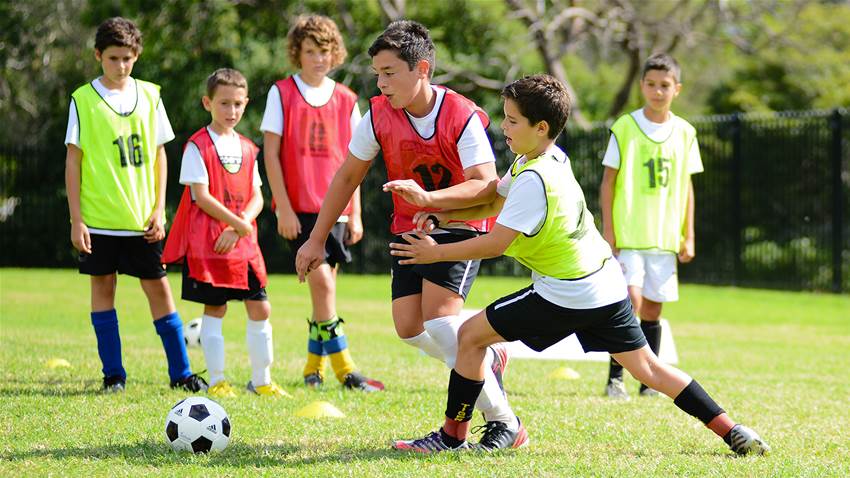One of the biggest complaints we have about football at the junior level is that parents are forking out a lot of money but don’t feel like they are getting a good return on their investment.
Now in any other business, if you flash out the dollars, you would expect and normally receive high quality client service. Football clubs need to start thinking of families as more than just money trees, they need to be given the proper “client experience” according to Sydney based junior soccer coach Mal Stipicic.
“Parents want bang for their buck, they want value for money and who can blame them,” says Stipicic. “Clubs are good at asking for money and sure they let players play and give them a coach but when other sports are providing a better experience overall, we have to ask what is football doing wrong.
“We charge way more than other sports so we need to make it worthwhile.”
What does this mean?
A local junior Aussie Rules game in western Sydney last year underlined this notion. An under 12s community game between Ingleburn Magpies and Campbelltown Swans was a fun way to spend a Friday night.
What was brilliant was how organised everyone and everything was. It was run like clock work and the attention to detail was brilliant. It was a wonderful experience for the kids and their parents. All of it was run by volunteers too.
Firstly the coach had a proper bib showing he was the coach. He had a magnet board and there were proper chairs for the kids on the bench. There were runners, medical staff, water carriers etc. all with properly coloured bibs.
The kids ran out to their club song playing in the background. Occasionally they have banners. They also have milestone banners when kids play 50 or 100 games. Strewn across the fences were junior premiership flags won by clubs.
There was a ground manager there to keep everyone in line and ensure things went smoothly. A proper scoreboard. There was even music playing from the speakers. The ground was well maintained and looked great under lights. The umpires were a mix of young and old. The canteen was well run.
It was a great night’s entertainment. And it was just an under 12 community game.
“I’m not an Aussie rules person by any means, but that sounds like a brilliant experience,” says Stipicic. “Aussie rules does it really well.
“We have lost players to Aussie rules and when the Giants and Swans come and visit schools and give kids chances to meet footballing idols, they will capture these kids.”
Speaking to parents at the junior Aussie rules game at Ingleburn, they were glowing in how much they loved spending time at their club. They spoke well of how going to the footy with their kids was great fun and not a chore. They explained how organised it was meaning they could sit back and just enjoy watching.
What was also good to hear was how these junior clubs were closely linked to the GWS Giants, who run academies and who provide pathways for the talented kids. The Giants also run sessions for junior coaches who can actually meet the senior GWS coach’s and get tips and suggestions for coaching sessions.
The Giants also have gala weekends and give kids a chance to play little league on AFL matchdays. It is all well organised!
“I just don’t see many A-League clubs or even the Socceroos or Matildas doing this as much as the AFL,” laments Stipicic. “The Wanderers do a great job but it doesn’t get the same reaction as say the Giants or Swans.
“What are these sports doing better?”
The ones who deserve the credit for this, apart from the amazing volunteers, is the AFL. They have spent a lot of money to make sure all the right resources, infrastructure and support is put in place for volunteers, clubs and parents so that they enjoy their experience. A smart business move.
“Having been involved in junior soccer around Granville and Fairfield for decades, I must say as a coach I love the experience,” says Stipicic. “Saturday mornings around various venues, no matter how cold, was always fun and the kids and most parents made it so.
“However what often struck me was how parents from a variety of clubs, often seemed to see soccer as a burden or inconvenience. Many didn’t feel a connection to their club or the game. Whilst some did enjoy themselves, it often felt to many that going to soccer was just something they did for their kids. It wasn’t part of their own experience as well, which is sad.”
There are plenty of soccer clubs around the country that work hard at fixing this. Many want their juniors and parents to feel a part of the fabric of their club. Many club committees bend over backwards to ensure parents are getting bang for their buck. However the lack of volunteers makes it very hard.
FFA do not invest anywhere near the resources they should to fix this. Throwing money at the problem won’t fix it but it certainly helps. Investing in good coaches, infrastructure, pathways, good experiences and so on goes a long way to keeping people attracted to the game.
By building better connections between clubs, parents and the game of soccer itself, you are likely to get more volunteers and more “qualified” volunteers at that. What this means is getting people who know what they are doing and can perform their role so that the “clients” (I.e. parents) are kept happy and thus have no issues paying their fees.
Far too many soccer parents think of themselves as a money train for FFA. They clearly aren’t getting the client experience.
Now what’s the underlying reason for this? The last AFL TV deal generated $2.5 billion for the AFL. FFA made $350 million. Therein lies the difference.
“However this can’t always be used as an excuse,” points out Stipicic. “At some point FFA, State Federations and junior clubs need to start engaging parents more, show them it’s worth it. The client experience goes a long way.”
Related Articles

Champion A-League coach set to join Premier League giants

Emerging Socceroos star set to sign for MLS club













